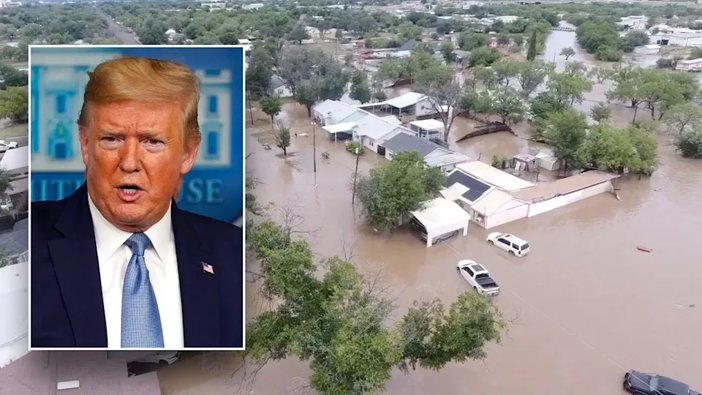
Texas Floods Spark Criticism Over Trump Weather Cuts
Critics blame Trump’s staffing cuts at the National Weather Service for Texas floods, but officials defend forecasting and response.
Debate Erupts Over Texas Flood Tragedy and Federal Weather Policy
The devastating flash floods in Texas have triggered a fierce debate about the impact of President Donald Trump’s spending cuts on the National Weather Service (NWS) and federal climate policy. At least 59 people, including 21 children, died when the Guadalupe River overflowed after the remnants of Tropical Storm Barry stalled over the region, unleashing torrential rains. Eleven children and a counselor remain missing from a summer camp caught in the disaster.
Critics quickly pointed to recent reductions in federal weather agency staffing as a factor that contributed to the scale of the tragedy. Prominent political commentators and Democratic officials argued that budget cuts under the Trump administration hampered accurate storm prediction and rapid response. Social media posts and statements from political figures accused the administration of prioritizing spending cuts over public safety, with some suggesting that skepticism about climate change science influenced the decision to reduce weather service resources.
Officials and Meteorologists Defend Storm Forecasts
Homeland Security Secretary Kristi Noem addressed concerns in a Saturday press conference, acknowledging shortcomings in the nation’s flood notification systems but affirming that efforts were underway to modernize technology. Noem described the notification system as “ancient” and emphasized the unpredictable nature of the storm. Meteorologists and NWS officials, meanwhile, defended their performance, highlighting that timely flood watches and warnings were issued well ahead of the disaster.
Tom Fahy of the National Weather Service Employees Organization stated that forecasting offices were properly staffed and that alerts were sent out in advance. Texas-based meteorologist Avery Tomasco added that a flood watch was issued for the region more than 12 hours before the event, and a flash flood warning came three hours before river levels surged. Other weather experts echoed these assessments, noting that the disaster was caused by unusually unpredictable and intense conditions rather than lapses in forecasting.
Despite the advanced warnings, criticism of the administration continued to mount. Some public figures accused the president of gutting weather agencies as part of a broader attack on climate science, while others called for congressional investigations and increased accountability. Lawmakers like Rep. Joaquin Castro and state Senator Scott Wiener called attention to unfilled leadership positions and the need for stronger federal response measures in the future.
White House Condemns Politicization of Tragedy
The White House responded forcefully to the criticisms, calling it “shameful and disgusting” for political opponents to use the tragedy for partisan attacks. Press secretary Abigail Jackson stated that the NWS had acted professionally and that claims of neglect were “repeatedly debunked by meteorologists, experts, and other public reporting.” The administration praised first responders and promised ongoing support for Texas recovery efforts.
The tragedy along the Guadalupe River underscores the ongoing debate over the role of federal investment in public safety, disaster preparedness, and climate policy. As families mourn the lives lost and rescue operations continue, the controversy is likely to intensify political scrutiny of weather service funding and the government’s response to natural disasters in an era of increasingly severe weather events.






